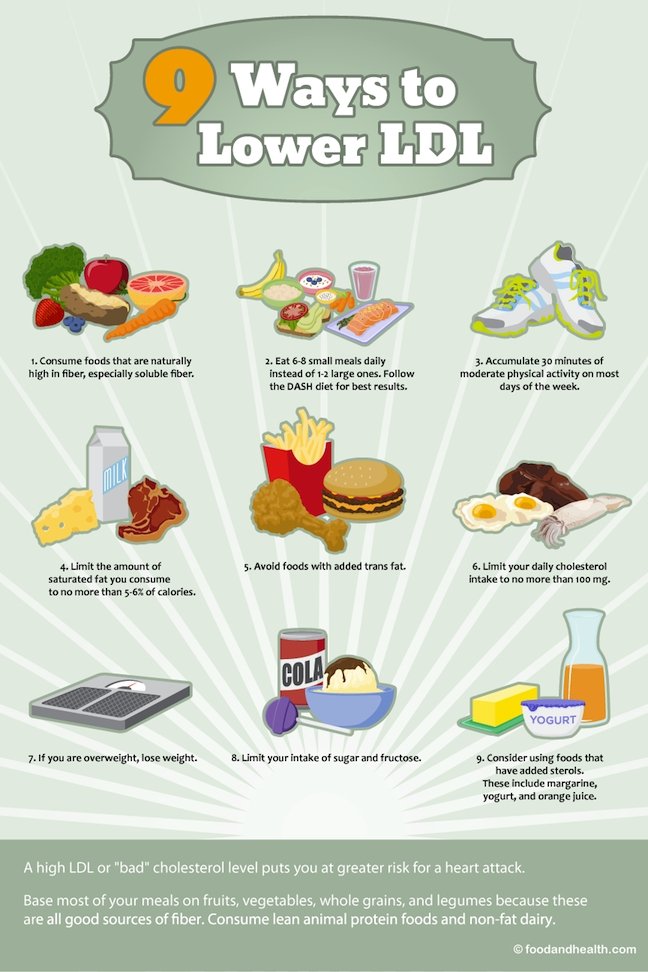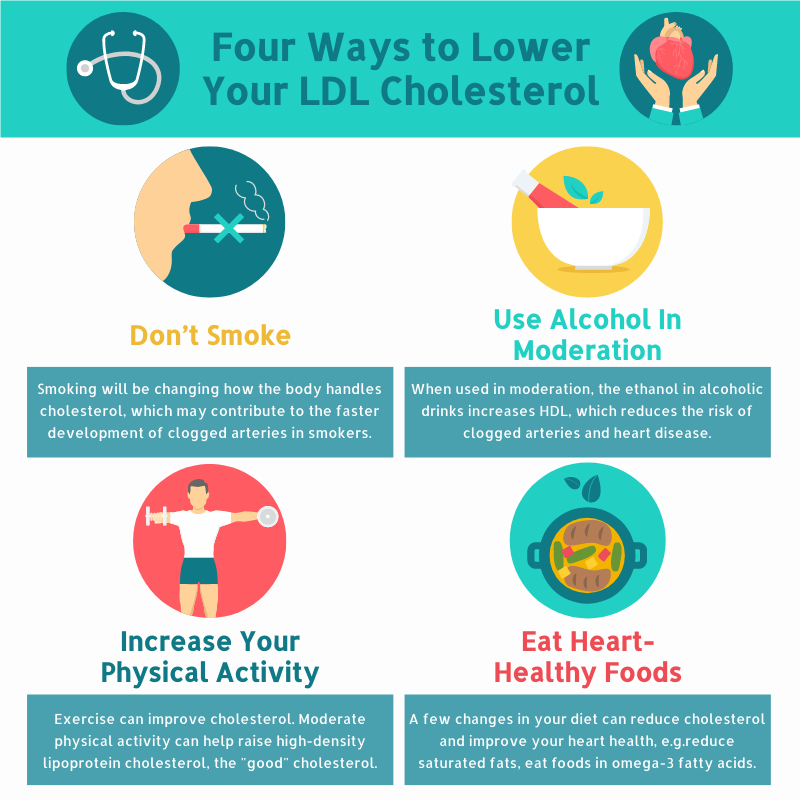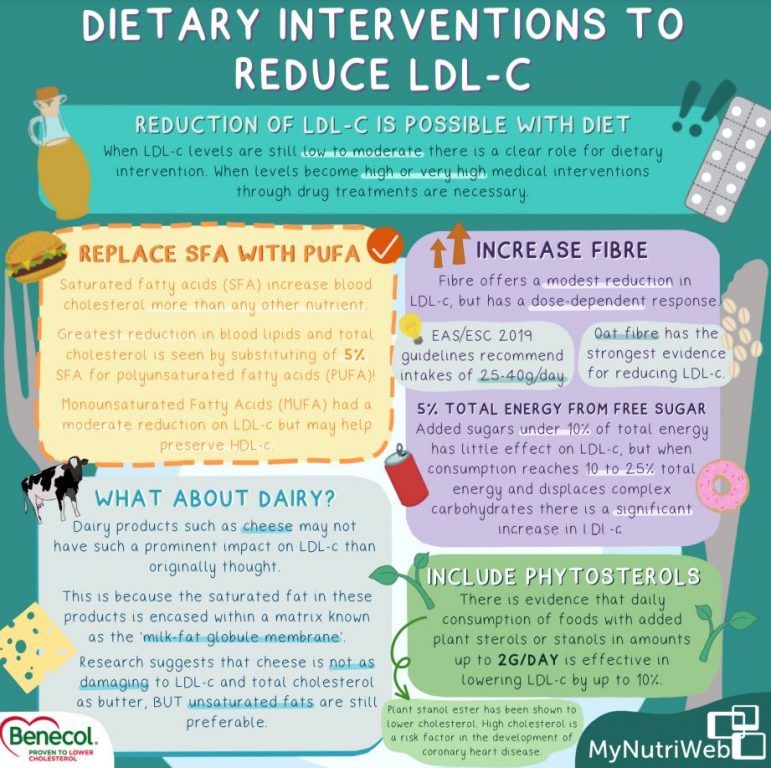Discover the secrets to lowering LDL cholesterol naturally through simple dietary adjustments and improve your heart health today.
Table of Contents
- Introduction: Learning About LDL Cholesterol
- What is Cholesterol?
- The Effects of High LDL Cholesterol
- Eating for Your Heart
- Foods to Favor
- Foods to Avoid
- Creating a Heart-Healthy Plate
- Fun Heart-Healthy Recipes
- Cholesterol Management Beyond Diet
- Talking to a Doctor
- Summary: Heart-Healthy Habits
- Frequently Asked Questions (FAQs)
Introduction: Learning About LDL Cholesterol
Have you ever heard of LDL cholesterol? It’s an essential part of our health that we should all know about, especially when it comes to taking care of our hearts. Let’s dive into what LDL cholesterol is, why it matters, and how it can affect our overall well-being.
LDL cholesterol, often referred to as “bad” cholesterol, is a type of cholesterol that can build up in our blood vessels and increase the risk of heart disease. Keeping our LDL cholesterol levels in check is crucial for maintaining a healthy heart and overall well-being. Let’s explore more about this important topic.
What is Cholesterol?
Cholesterol is a type of fat found in our bodies that is essential for our health. It plays a crucial role in building healthy cells and hormones that help our bodies function properly. Despite its importance, too much cholesterol, specifically LDL cholesterol, can be harmful to our heart health.
Good vs. Bad Cholesterol
Cholesterol travels through our bloodstream in two forms: low-density lipoprotein (LDL) cholesterol and high-density lipoprotein (HDL) cholesterol. LDL cholesterol is often referred to as the “bad” cholesterol because when there’s too much of it, it can lead to build-up in our arteries, increasing the risk of heart disease. On the other hand, HDL cholesterol is known as the “good” cholesterol because it helps remove LDL cholesterol from our arteries, reducing the risk of heart problems.
The Effects of High LDL Cholesterol
So, we know that LDL cholesterol is the “bad” type of cholesterol that can cause problems for our hearts and overall health. But why exactly is having high LDL cholesterol not good for us?

Image courtesy of nutritioneducationstore.com · In stock via Google Images
Understanding Heart Disease
Imagine your heart as a strong muscle that pumps blood to all parts of your body. Now, if too much of that bad LDL cholesterol builds up in your blood vessels, it can make them narrow and clogged. This makes it harder for blood to flow smoothly to your heart and other organs. Over time, this can lead to serious problems like heart attacks and strokes.
So, it’s important to keep our LDL cholesterol levels in check to protect our hearts and stay healthy!
Eating for Your Heart
When it comes to taking care of your heart, the food you eat plays a crucial role. By making smart dietary choices, you can help manage your cholesterol levels and keep your heart healthy. Let’s explore how the right foods can make a big difference in your heart health.
Foods to Favor
One of the key nutrients that can help lower LDL cholesterol levels is omega 3. Omega 3 is a type of healthy fat that is known to be beneficial for the heart. You can find omega 3 in foods like fatty fish (such as salmon and tuna), flaxseeds, and walnuts. Including these foods in your diet can have a positive impact on your heart health.
Fruits and Veggies
Fruits and vegetables are not only delicious but also great for your heart. They are packed with essential vitamins, minerals, and antioxidants that support overall heart health. Eating a variety of colorful fruits and vegetables can help lower LDL cholesterol and reduce the risk of heart disease.
Foods to Avoid
On the other hand, there are certain foods that can raise your LDL cholesterol levels and increase your risk of heart disease. It’s best to limit foods high in saturated fats, such as red meat, full-fat dairy products, and processed foods. These types of fats can raise your bad cholesterol levels and harm your heart.
Skip the Saturated Fats
Saturated fats are fats that are solid at room temperature and are often found in animal products and other processed foods. These fats can clog your arteries and increase your LDL cholesterol levels. By cutting back on foods high in saturated fats, you can help keep your heart healthy and your cholesterol in check.
Foods to Favor
Omega 3 is a special type of fat that is known to be really good for our hearts. Foods like salmon, walnuts, and flaxseeds are packed full of omega 3. When we eat these foods, they can help lower our LDL cholesterol levels, which is great for keeping our hearts healthy.

Image courtesy of www.pinterest.com via Google Images
Fruits and Veggies
Another way to take care of our hearts is by eating lots of fruits and veggies. Colorful fruits like strawberries, blueberries, and oranges, along with vegetables like spinach, broccoli, and carrots, have vitamins and nutrients that help our bodies stay strong and keep our cholesterol levels in check. Plus, they taste delicious!
Foods to Avoid
When it comes to managing your LDL cholesterol levels and keeping your heart healthy, it’s not just about the foods you should be eating. It’s also important to be mindful of the foods you should avoid or limit in your diet. Let’s take a look at some types of foods that can elevate your LDL cholesterol and why it’s best to steer clear of them.
Skip the Saturated Fats
Saturated fats are a type of fat that can be found in various foods, such as butter, cheese, red meat, and processed snacks like chips and cookies. Consuming too much saturated fat can raise your LDL cholesterol levels, putting you at risk for heart problems down the line. It’s best to limit your intake of these foods and opt for healthier alternatives instead.
Creating a Heart-Healthy Plate
When it comes to maintaining a healthy heart, the food we eat plays a vital role. By creating a plate filled with nutritious and heart-friendly foods, we can help lower LDL cholesterol levels and promote overall heart health.

Image courtesy of online.visual-paradigm.com via Google Images
Building the Perfect Plate
Creating a heart-healthy plate is all about balance. Here are some simple steps to guide you:
- Fill half of your plate with colorful fruits and vegetables. These foods are rich in vitamins, minerals, and fiber that are good for your heart.
- Add a source of lean protein, such as fish, chicken, beans, or tofu, to a quarter of your plate. Protein is essential for growth and development.
- Include a small portion of whole grains, like brown rice, quinoa, or whole-grain bread, in the last quarter of your plate. Whole grains provide energy and fiber to keep you full and satisfied.
- Don’t forget to add a serving of healthy fats, like avocados, nuts, or olive oil, to your plate. These fats can help lower bad cholesterol and reduce inflammation in the body.
- Opt for water or unsweetened beverages to wash it all down. Sugary drinks can contribute to weight gain and increase the risk of heart disease.
Benefits of a Heart-Healthy Plate
By building a plate full of nutritious foods that support heart health, you’re not only lowering your LDL cholesterol levels but also providing your body with essential nutrients to function at its best. Eating this way can reduce the risk of heart disease, keep your heart strong, and help you feel your best every day.
Fun Heart-Healthy Recipes
Looking for tasty and heart-friendly recipes to keep your cholesterol levels in check? Check out these easy and delicious options that you can try out!
| Nutrient | Effect | Food Sources |
|---|---|---|
| Fiber | Helps lower LDL cholesterol levels | Whole grains, fruits, vegetables, legumes |
| Healthy Fats | Can improve cholesterol levels | Avocado, nuts, olive oil, fatty fish |
| Omega-3 Fatty Acids | Reduces inflammation and lowers LDL | Salmon, flaxseeds, chia seeds |
| Plant Sterols | Helps block absorption of cholesterol | Fortified foods, nuts, seeds |
| Antioxidants | Protects against LDL oxidation | Berries, dark chocolate, green tea |
Omega 3-Rich Foods
Omega 3 fatty acids are excellent for your heart health. Try incorporating more of these foods in your diet:
- Salmon: Grill or bake some salmon for a flavorful and healthy meal packed with omega 3.
- Chia seeds: Sprinkle chia seeds over your yogurt or add them to a smoothie for a nutritious boost.
- Walnuts: Toss some walnuts into your salad or oatmeal for a crunchy and heart-healthy addition.
Fruits and Veggies
Fruits and vegetables are essential for maintaining a healthy heart. Here are some colorful options to include in your meals:
- Blueberries: Add a handful of blueberries to your morning cereal or oatmeal for a sweet and antioxidant-rich treat.
- Spinach: Sautee some spinach with garlic for a quick and nutritious side dish that’s great for your heart.
- Broccoli: Roast or steam broccoli with a sprinkle of Parmesan cheese for a delicious and heart-healthy veggie option.
By incorporating these omega 3-rich foods and a variety of fruits and vegetables into your diet, you’ll be on your way to maintaining healthy cholesterol levels and a strong heart!
Cholesterol Management Beyond Diet
When it comes to keeping your cholesterol levels in check, it’s not just about what you eat. There are other important aspects of your lifestyle that play a role in maintaining a healthy heart.

Image courtesy of benecol.co.uk via Google Images
Exercise for a Healthy Heart
Exercise is a key component of cholesterol management. Getting regular physical activity can help raise your HDL (good) cholesterol levels and lower your LDL (bad) cholesterol levels. This is great news for your heart!
Say No to Smoking
Smoking is not only bad for your lungs, but it can also harm your heart health. Smoking can lower your good cholesterol levels and raise your bad cholesterol levels, putting you at a higher risk for heart disease. It’s important to avoid smoking and stay away from secondhand smoke.
By incorporating regular exercise into your routine and steering clear of smoking, you’re already making big strides in managing your cholesterol levels and taking care of your heart.
Talking to a Doctor
When it comes to managing your cholesterol levels, talking to a doctor is a crucial step. Your doctor is like a health detective who can help you understand how to make sure your heart stays healthy and strong.
The Importance of Regular Check-Ups
Visiting the doctor regularly is super important because they can check on your cholesterol levels and give you tips on how to keep them in a healthy range. They might even order a blood test to see how much LDL cholesterol you have in your body.
How a Doctor Can Help Manage Cholesterol Levels
Your doctor can work with you to create a plan that helps you lower your LDL cholesterol if it’s too high. They might suggest making changes to your diet, adding more healthy foods like fruits, veggies, and omega-3-rich foods. They may also recommend exercises that can help keep your heart strong.
Remember, doctors are there to help you stay healthy and feel your best. Don’t be afraid to ask questions or share any concerns you have.
Summary: Heart-Healthy Habits
In conclusion, practicing heart-healthy habits can significantly impact our overall well-being by managing LDL cholesterol levels, which are crucial for heart health. By making simple dietary and lifestyle changes, we can work towards maintaining a healthy balance in our bodies.

Image courtesy of blog.csiro.au via Google Images
It all starts with understanding what cholesterol is and why too much LDL cholesterol can be harmful. Taking steps to include more heart-healthy foods in our diet, like omega 3-rich options and plenty of fruits and veggies, can go a long way in supporting our heart health.
Avoiding foods high in saturated fats is also key to managing LDL cholesterol, as these fats can raise levels of the ‘bad’ cholesterol. By creating balanced and heart-healthy meal plates, we can ensure we are nurturing our bodies in the best way possible.
Not only can we focus on diet, but engaging in regular exercise and steering clear of habits like smoking can further help to manage our cholesterol levels. Remember, it’s vital to communicate with a healthcare provider about our cholesterol management and overall heart health.
By incorporating these heart-healthy habits into our daily routines, we can take positive steps towards caring for our hearts and ensuring a healthier future for ourselves.
Frequently Asked Questions (FAQs)
What is LDL cholesterol and why is it important?
LDL cholesterol is often referred to as the “bad” cholesterol because having high levels of it can lead to plaque buildup in our arteries, increasing the risk of heart disease and other health issues. Keeping LDL cholesterol levels in check is crucial for maintaining a healthy heart.
How can I lower my LDL cholesterol through dietary changes?
One of the most effective ways to lower LDL cholesterol is by making healthy food choices. Including foods rich in omega 3 fatty acids, such as salmon and walnuts, can help lower LDL cholesterol levels. Additionally, focusing on a diet high in fruits, vegetables, and whole grains can positively impact heart health.
Why should I avoid foods high in saturated fats?
Foods high in saturated fats, such as butter, cheese, and red meat, can raise LDL cholesterol levels. Limiting these foods in your diet can help lower your overall cholesterol levels and reduce the risk of heart disease.
How can I create a heart-healthy plate?
To create a heart-healthy plate, try to include a variety of colorful fruits and vegetables, whole grains, lean proteins like chicken or fish, and healthy fats like avocados or olive oil. By balancing your plate with these nutrient-rich foods, you can support your heart health and manage your cholesterol levels.
What are some simple heart-healthy recipes I can try?
Simple recipes like grilled fish tacos with mango salsa, spinach and berry smoothie bowls, or quinoa and vegetable stir-fry can be delicious and nutritious options to help maintain healthy cholesterol levels. Experimenting with different ingredients and flavors can make eating heart-healthy foods fun and exciting!
What lifestyle choices can help with managing cholesterol levels?
In addition to making healthy dietary choices, staying active through regular exercise and avoiding smoking are crucial for managing cholesterol levels. Regular physical activity and not smoking can help improve heart health and lower the risk of heart disease.
Why is it important to talk to a doctor about my cholesterol levels?
Your doctor can provide personalized guidance on managing your cholesterol levels based on your individual health needs. Regular check-ups and discussions with your doctor can help track your progress, adjust your treatment plan if needed, and ensure you are on the right path to a healthy heart.




